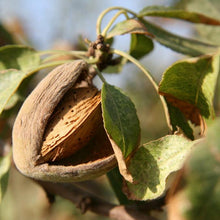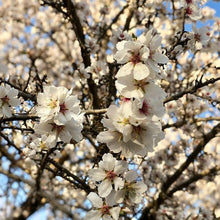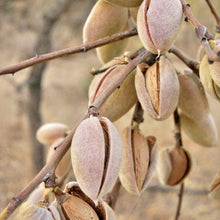|
Mature height x width: |
approx 20' x 20' |
|
Recommended initial spacing: |
5'-10' in rows 22' apart (to thin later) |
|
Recommended final spacing: |
10'-22' x 22' |
| Hardy to: | approx -25°C (-10-15 F) |
|
Preferred soil: |
deep, moist, fertile, well-drained soil |
|
Good for: |
great flavour, ornamental, fast-growing |
|
Uses: |
dessert, main dish, oil, nut butter |
Almonds are a relative of peaches: a fruit with tough flesh and a pit containing a delicious nut. A delicious and versatile nut that can be dried, roasted, sprouted, pressed into oil, or ground into butter. Incredible flowers in spring. Like other stone fruit, they are pollinated by bees and other insects. Life expectancy is around 50 years. These almonds are seedlings from healthy trees on Denman Island and Vancouver Island in the Pacific Northwest.
Planting: Almonds want full sun with light, fertile, well-drained soils. They flower early in the season and buds are susceptible to frost damage, so avoid planting in frost pockets. Tolerant of pH between 5.5 and 8.5 (ideal is between 6.5-8). While almonds are infamous as water-hungry trees in California, they are actually relatively drought-tolerant, though ample water will increase yields.
Why seedlings? Growing seedlings from high-quality parents helps maintain diversity (each seed is a new variety) while drawing on some of the best genetics. In other words, by planting some of these seedlings, you are participating in the breeding new, regionally-adapted varieties! Compared to clonally propagated trees, seedlings tend to have more robust root systems, increased vigour and drought-tolerance.
Why potted? If you won't be planting your trees right away and you don't feel sure about storing bare root trees then you want potted trees. Potted trees will allow you more flexibility with transplanting timelines and late spring installations, however, they are more expensive to produce and to ship.
Our nuts are grown in tree pots, which are designed with a large opening at the bottom to air prune the root. When the taproot reaches the bottom, instead of circling around, the opening enables the root to gently 'self-prune' itself, stimulating the growth of feeder roots further up.





